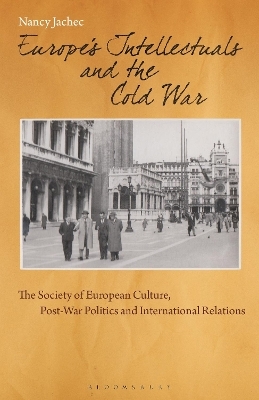
Europe's Intellectuals and the Cold War
The European Society of Culture, Post-War Politics and International Relations
Seiten
2015
I.B. Tauris (Verlag)
978-1-78076-370-5 (ISBN)
I.B. Tauris (Verlag)
978-1-78076-370-5 (ISBN)
The first history of an influential organisation and a new look at Cold War politics.
In 1950, nearly 300 of Europe's leading artists, philosophers and writers formed an international society intended to end the Cold War. The European Society of Culture was composed of many of Western Europe's best-known intellectuals, including Theodor Adorno, Julien Benda, Albert Camus, Benedetto Croce, Andre Gide, J. B. Haldane, Karl Jaspers, Carl Jung, Thomas Mann, Henri Matisse, Francois Mauriac, Maurice Merleau-Ponty, Jean-Paul Sartre, Giuseppe Ungaretti and Albert Schweitzer, among many others; over the next twenty years it would also include many luminaries from the East, such as Bertolt Brecht, Ernst Bloch, Ilya Ehrenburg and Georg Lukacs. Pioneering the earliest political discussions between intellectuals in Eastern and Western Europe that would serve as a model for the activities of the better-known CCF in its efforts to end communism, the ESC went on to create an informal but powerful, 1,600 member-strong cultural and political network across the world in pursuit of dialogue between the Marxist East and the liberal West, and in pursuit of peace and shared cultural values.
Here, in this first, comprehensive history of the SEC's early years, Nancy Jachec demonstrates the influence its members had not only on preventing the isolation of Europe's eastern states, but on enabling the flow of people, publications and ideas from the West into the East, thus playing a vital role in introducing the ideals of human rights and cultural rights in the East in the run-up to the signing of the Helsinki Accords of 1975. She also shows the profound impact that the SEC had on the development of post-colonial theory through the exchanges it organised between European and African intellectuals, directly shaping the expectations statesmen like Leopold Sedar Senghor, revolutionaries like Frantz Fanon, and institutions such as Unesco would have of culture in newly emerging countries.
In 1950, nearly 300 of Europe's leading artists, philosophers and writers formed an international society intended to end the Cold War. The European Society of Culture was composed of many of Western Europe's best-known intellectuals, including Theodor Adorno, Julien Benda, Albert Camus, Benedetto Croce, Andre Gide, J. B. Haldane, Karl Jaspers, Carl Jung, Thomas Mann, Henri Matisse, Francois Mauriac, Maurice Merleau-Ponty, Jean-Paul Sartre, Giuseppe Ungaretti and Albert Schweitzer, among many others; over the next twenty years it would also include many luminaries from the East, such as Bertolt Brecht, Ernst Bloch, Ilya Ehrenburg and Georg Lukacs. Pioneering the earliest political discussions between intellectuals in Eastern and Western Europe that would serve as a model for the activities of the better-known CCF in its efforts to end communism, the ESC went on to create an informal but powerful, 1,600 member-strong cultural and political network across the world in pursuit of dialogue between the Marxist East and the liberal West, and in pursuit of peace and shared cultural values.
Here, in this first, comprehensive history of the SEC's early years, Nancy Jachec demonstrates the influence its members had not only on preventing the isolation of Europe's eastern states, but on enabling the flow of people, publications and ideas from the West into the East, thus playing a vital role in introducing the ideals of human rights and cultural rights in the East in the run-up to the signing of the Helsinki Accords of 1975. She also shows the profound impact that the SEC had on the development of post-colonial theory through the exchanges it organised between European and African intellectuals, directly shaping the expectations statesmen like Leopold Sedar Senghor, revolutionaries like Frantz Fanon, and institutions such as Unesco would have of culture in newly emerging countries.
Nancy Jachec is a former academic, and has been writing about international cultural relations for the past 20 years. She holds an MA from the Courtauld Institute of Art and a PhD from University College London. Her previous books include The Philosophy and Politics of Abstract Expressionism 1940-1960 (Cambridge UP, 2000), Painting and Politics at the Venice Biennale, 1948-64: Italy and the Idea of Europe (Manchester UP, 2007) and Jackson Pollock Works/Writings/Interviews (Ediciones Poligrafa, 2011).
| Erscheint lt. Verlag | 31.7.2015 |
|---|---|
| Zusatzinfo | 29 bw integrated |
| Sprache | englisch |
| Maße | 138 x 216 mm |
| Gewicht | 592 g |
| Themenwelt | Geschichte ► Allgemeine Geschichte ► Zeitgeschichte |
| Geisteswissenschaften ► Geschichte ► Regional- / Ländergeschichte | |
| Sozialwissenschaften ► Politik / Verwaltung ► Europäische / Internationale Politik | |
| ISBN-10 | 1-78076-370-0 / 1780763700 |
| ISBN-13 | 978-1-78076-370-5 / 9781780763705 |
| Zustand | Neuware |
| Haben Sie eine Frage zum Produkt? |
Mehr entdecken
aus dem Bereich
aus dem Bereich
Gewalt, Umwelt, Identität, Methode
Buch | Softcover (2024)
Spector Books OHG (Verlag)
CHF 49,95


